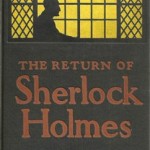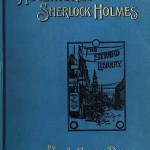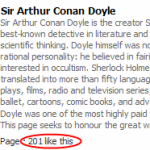“That he desired to conceal his handwriting.”
“But why? What can it matter to him that his landlady should have a word of his writing? Still, it may be as you say. Then, again, why such laconic messages?”
“I cannot imagine.”
“It opens a pleasing field for intelligent speculation. The words are written with a broad-pointed, violet-tinted pencil of a not unusual pattern. You will observe that the paper is torn away at the side here after the printing was done, so that the ‘s’ of ‘soap’ is partly gone. Suggestive, Watson, is it not?”
“Of caution?”
“Exactly. There was evidently some mark, some thumbprint, something which might give a clue to the person’s identity. Now. Mrs. Warren, you say that the man was of middle size, dark, and bearded. What age would he be?”
“Youngish, sir–not over thirty.”
“Well, can you give me no further indications?”
“He spoke good English, sir, and yet I thought he was a foreigner by his accent.”
“And he was well dressed?”
“Very smartly dressed, sir–quite the gentleman. Dark clothes–nothing you would note.”
“He gave no name?”
“No, sir.”
“And has had no letters or callers?”
“None.”
“But surely you or the girl enter his room of a morning?”
“No, sir; he looks after himself entirely.”
“Dear me! that is certainly remarkable. What about his luggage?”
“He had one big brown bag with him–nothing else.”
“Well, we don’t seem to have much material to help us. Do you say nothing has come out of that room–absolutely nothing?”
The landlady drew an envelope from her bag; from it she shook out two burnt matches and a cigarette-end upon the table.
“They were on his tray this morning. I brought them because I had heard that you can read great things out of small ones.”






